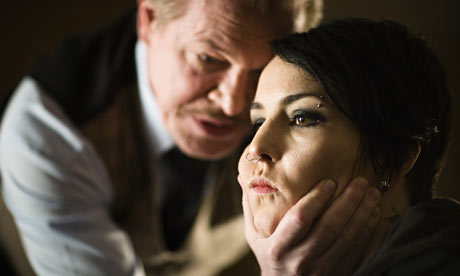The Girl With the Dragon Tattoo: feminist, or not?
källa:
http://www.guardian.co.uk/books/booksblog/2010/mar/15/girl-with-the-dragon-tattoo
Stieg Larsson's bestselling thriller The Girl With the Dragon Tattoo divided the critics, now the film has united them – and not in a good way

Sexist titillation? … Peter Andersson and Noomi Rapace in The Girl With the Dragon Tattoo. Photograph: Knut Koivisto
The debate has raged ever since Stieg Larsson's bestselling thriller, the first in a trilogy, was published in Sweden in 2005, a year after the author's death. The film, released in the UK last Friday – described by the Guardian's Peter Bradshaw as "a forensic procedural with explicit violence" – seems to have muddied the waters further.
Originally titled Men Who Hate Women, the book divided critics. Some saw Lisbeth Salander (the tattooed private investigator of the title) as a feminist avenging angel. Others criticised Larsson's graphic descriptions of the abuse and mutilation of women, judging the whole effort "misogynist".
It's all very confusing if you come to the story a bit after the event, which, like many, I have. Not being a thriller fan, I spurned the Dragon Tattoo bandwagon for a long time. When a book is as hyped as this, you have certain preconceptions: I imagined cliches and extreme violence. I was pleasantly surprised, then, to discover it is neither formulaic nor disturbingly graphic. And it was indeed Larsson's take on feminism that made it stand out as an original read.
The book promotes a very Scandinavian sort of equality. The message I took from it was that gender is irrelevant. We behave the way we do because of our individual characters and personal histories. In Larsson's world, it's the psychopaths who split the world along gender lines. And, boy, do they get their comeuppance.
But not everyone agrees. This f-word blog rounds up the initial reviews of the book, concluding that Larsson's rape and murder fantasies are little more than sexist titillation. Melanie Newman concludes that she has "difficulty squaring Larsson's proclaimed distress at misogyny with his explicit descriptions of sexual violence, his breast-obsessed heroine and babe-magnet hero".
Interestingly, in Joan Smith's original, positive review of the book in the Sunday Times she doesn't really take on Larsson's feminism, noting only that as an activist: "Larsson's other great preoccupation [alongside the fascist movement] was violence against women, and the scarcely believable horrors Blomkvist unearths are as rooted in misogyny as they are in fascism."
Others take the feminism as read. In the Times, Christina Konig describes it as combining "a contemporary feminist polemic with a good old-fashioned thriller". Feministing.com sees Lisbeth Salander as "basically a feminist avenger".
So far, the film has been less divisive. It has been universally panned as anti-women. In her review in Harper's Bazaar this month, Mariella Frostrup writes: "A potentially good mystery is lost in scenes – such as a violent rape – that dwell too much on what feels to me like Larsson's misogynistic fantasies." On the Arts Desk blog, Graham Fuller judges the film "scarcely feminist". He writes: "In frankly depicting Lisbeth's rapes and presenting an obscene array of photographs of murdered women in a killer's lair, it comes across as glibly indulgent of those visual horrors."
In the novel Larsson spares us many graphic descriptions, leaving a lot of the worst to our imagination. It seems, then, that the film has betrayed not only some of the book's original subtlety but also its feminism. I waited too long to read the book. I think I'll give the film a miss altogether.
